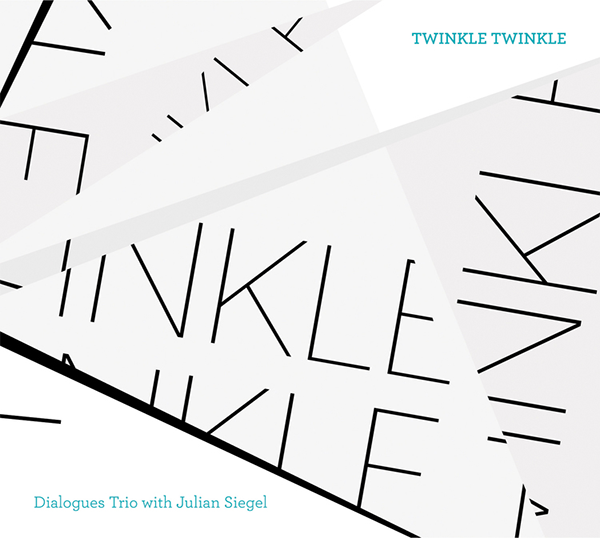
by Ian Mann
April 15, 2012
/ ALBUM
An intriguing project which sees Heinen and his colleagues sketching variations around the theme of the childhood nursery rhyme "Twinkle,Twinkle Little Star".
Bruno Heinen’s Dialogues Trio with Julian Siegel
“Twinkle Twinkle”
(Babel Records BDV11100)
London based pianist and composer Bruno Heinen formed his Dialogues Trio in 2005 when studying for his Jazz Masters Degree at London’s Guildhall School of Music. His fellow trio members bassist Andrea Di Biase and drummer Jon Scott were students on the same course and the three have performed together intermittently ever since, fitting the trio around other commitments such as Di Biase’s work with veteran trumpeter Kenny Wheeler and Scott’s membership of the hugely successful Kairos 4tet.
Heinen was initially classically trained before studying jazz piano with the great John Taylor. Some of his other projects have reached across both genres, notably his adaptations of Karlheinz Stockhausen’s “Tierkreis” both for jazz sextet and for a trio of cello, double bass and piano, the latter as part of the CBSO (Birmingham) chamber music series. Heinen also works extensively with Palestinian singer Reem Kelani and has performed with many leading British jazz musicians including album guest Julian Siegel, saxophonists Martin Speake and Stan Sulzmann and vocalist Emily Saunders.
“Twinkle Twinkle” is an intriguing project which sees Heinen and his colleagues sketching variations around the theme of the childhood nursery rhyme “Twinkle,Twinkle Little Star”- a quote from Lewis Carroll’s 1865 adaptation from “Alice’s Adventures in Wonderland” adorns the sleeve. Heinen and the trio use the theme as a jumping off point for their own compositions, cunningly disguising and fragmenting the melody to create fresh compositions. Heinen is credited with five of the ten pieces and Di Biase with one with the other four credited to the band, presumably emerging directly from improvisations around the central “Twinkle Twinkle” theme.
One of Heinen’s acknowledged influences is Bill Evans and there’s an element of homage implied in both the style and the title of the opening piece “Waltz for Rossie”. The intimate interplay between the members of the trio is reminiscent of Evans’ classic groups with Scott Le faro, Paul Motian et al. Heinen sketches variations around Di Biase’s richly resonant bass and Scott’s quietly energetic, subtly detailed drumming.
The more angular, edgy “Spins Wins” marks the first appearance of guest reedsman Julian Siegel, appearing here on bass clarinet. The presence of Siegel on any recording is a definite plus and here he wraps knotty, sinuous bass clarinet lines around the stop start theme. Heinen also takes the chance to stretch out, probing gently in the kind of engaging three way dialogue that gives the trio its name.
Introduced by Di Biase at the bass “Nocturne” embraces a suitably crepuscular atmosphere and forms the basis for a lengthy interactive trio performance that sees Di Biase taking the lead at strategic points, his tone huge but supple. Heinen’s playing is gently exploratory, he’s a thoughtful player with a classically honed touch who favours gradual, linear developments over bravado displays of technique.
Credited as a band composition “Brigante” features Siegel on tenor saxophone, his warm tone filling the gaps between the trio’s restless rhythms. It’s more freely structured than what has come before suggesting that the piece is largely improvised as Siegel stretches out before a spooky coda.
“Venus” too, is credited to the band but initially feels more composed with a simple,catchy hook acting as the basis for improvisation. Jon Scott’s drums are mixed well forward and his colourful, subtly polyrhythmic drumming forms the focus for much of the performance.
The lovely “Sylvia’s Lament” is a delightful ballad performance featuring Siegel on breathy, tender tenor. Heinen and Di Biase are also at their most lyrical on subsequent solos.
Di Biase’s opening bass riff on “Jumping Rocks” is probably the least oblique statement of the “Twinkle Twinkle” theme on the entire record. From there the piece develops an unexpected Latin flavour with the bass theme constant almost throughout the piece as Heinen and Scott dance inventively around it.
“East and Rising” is another piece credited to the band and features Siegel adopting a brusque, gruff tone on bass clarinet. Again freely structured this sounds almost totally improvised with the first half representing the most forceful and “full on” playing on the album. The second half of the piece is gentler but no less exploratory and features longer bass clarinet lines above gently percolating rhythms.
Di Biase’s contribution with the pen, the elegant “Thick Thin” emphasises the core trio’s lyrical side and the interaction between the players. Scott’s delightfully detailed drumming is full of colour and nuance and he responds well to the leader’s promptings from the piano. Appropriately Di Biase leaves room for himself and delivers a dexterous, resonant solo, thereby distilling the elements from an assured all round performance.
The closing “Night Hue” represents the final “band” item and features Siegel on brooding bass clarinet on a piece whose nocturnal mood is neatly encapsulated by its title. It’s a gently atmospheric improvisation that also leaves space for a final statement from Di Biase before Heinen, with his customary delicacy softly brings the album to a conclusion.
There is much to enjoy on “Twinkle Twinkle” and the standard of musicianship is excellent throughout. If the record has a fault it is perhaps a lack of light and shade. There’s a studied, almost intellectual feel throughout and a “chamber jazz” atmosphere that some listeners may find rather cool and ascetic-although it can be fun trying to “spot the Twinkle”. Most of the time the source material is very cleverly disguised but there are moments when one wonders if Heinen’s self imposed parameters are just a little too restrictive.
blog comments powered by Disqus